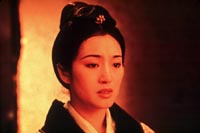The Emperor and the Assassin is too limiting a title for the new film by Chinese fifth generation director Chen Kaige (that's pronouned kai-guh), the director who also gave us Temptress Moon and Farewell My Concubine. Emperor is yet another beautifully shot Chinese period piece, which also means that the female star is the woman with perfect skin, Gong Li (The Chinese Box, Shanghai Triad, and pretty much every other epic film to come out of China in the past decade). This time, the story focuses on Ying Zheng, the man who eventually united the seven kingdoms of China into one in 221 BC.
Ying (Li Xuejian) is the power hungry leader of the Qin kingdom. He is slowly starting to believe that he is the one destined to bring together the warring kingdoms of China. Ying, believing he is divine, will stop at nothing to conquer all of China. Lady Zhao (Li) is the woman he wants to marry. They grew up together in the kingdom of Zhao, but Ying's increasing political aspirations are driving them further apart. In order to conquer the Yan kingdom, Ying and Zhao devise a plan in which the prince of Yan will send an assassin to Qin to kill Ying. The presence of the assassin will show Yan's treachery, giving Ying a valid reason to invade. Ying frees the prince of Yan, and together with Zhao, they return to Yan to find an assassin. The assassin they find is Jing Ke (Zhang Fengyi), who is no longer killing. After trying to convince Jing to attack Ying, she begins to fall in love with him. Meanwhile, Ying grows increasingly mad with power, setting out to conquer the kingdoms of Zhao and Han.
The part of the story involving the Emperor and the assassin only takes up a minimal amount of screen time. The rest of the movie is devoted to the political machinations of the Qin and Yan governments. Although the material is fascinating, Kaige tries to fit too much into the movie in a somewhat confusing manner. Four or five movies can be made with the amount of story in this one. The Emperor and the Assassin is beautifully shot an a grandiose scale. China is probably one of the few places where a movie can mobilize thousands of extras for a siege scene. The costumes are sets are equally detailed and beautiful. However, Kaige fails to engender any sense of emotion attachment between the audience and the characters in the movie. Zhao is the only character with real depth, and none of this is apparent until well into the movie. Zhang is so subdued that it seems like he is dead, and Li frequently skirts the level of overacting. The Emperor and the Assassin is still better than many domestic films, but if you want to watch a large scale Chinese period piece, you may want to rent one of the earlier ones.
